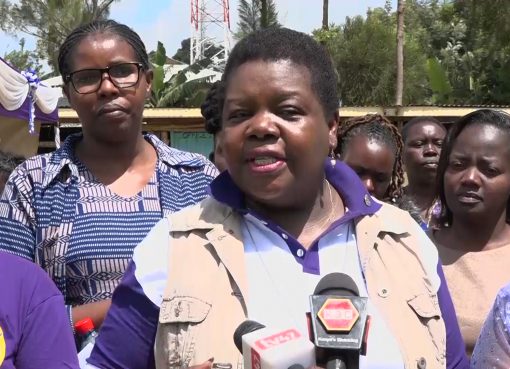Chuka University Deputy Vice Chancellor Prof. Gilbert Nduru has encouraged young people to be in the lead in championing menstrual health programmes and awareness within their communities.
Speaking during a menstrual health campaign held at Iruma Primary School in Chuka/Igambang’ombe Constituency on Sunday, Prof. Nduru noted that the youth were the right people to mentor their peers as well as provide information on menstrual health hygiene, adding that they were better placed to be understood by teenagers and young adults.

Prof. Nduru, who is in charge of Academics, Research, and Student Affairs, reiterated that peer engagements served as the best avenue to offer guidance and information on such programmes, citing that most young adults would be more convinced and comfortable to engage in such conversations with their peers.
“Younger people are understood more by their peers than older people. There is a common understanding between age groups, and this can go a long way in improving the menstrual health dialogue and awareness in society,” he said.
Joy Kendi, Founder and Chief Executive Officer of the WazaDada Initiative, an outfit that advocates menstrual health, said girls face challenges in accessing information about menstruation and affordable and appropriate sanitary products and lack adequate guidance on menstrual hygiene management.
Through her initiative, she has been able to advocate and mobilise resources for the development of menstrual hygiene management as well as provide information and services to school-going girls and boys in Tharaka Nithi County.
“WazaDada Initiative brings relevant stakeholders together to create awareness about menstrual health as well as give back to the community through the provision of dignity kits to both girls and boys. We are committed to involving boys in the conversation as a way of empowering them to be responsible and mindful of the girls,” Ms. Kendi said.
According to Kendi, a lack of adequate guidance on menstrual hygiene management leads adolescent girls to engage in transactional sex in order to buy menstrual products, since up to 65 per cent of women and girls in Kenya cannot afford sanitary pads.
A situation analysis conducted by the Ministry of Health in 2016 revealed that information about menstruation received from mothers was 87.7 per cent and 15.5 per cent from teachers, further revealing that 54 per cent of Kenyan girls faced challenges with access to menstrual health products, with 22 per cent of school-going girls indicating that they purchased their own sanitary products.
Chuka Municipality Chairman Gitonga Mutani, while giving his remarks, said that there was a need for more stakeholder engagement in the menstrual health campaigns, saying the county government is keen on ensuring departmental harmonisation in the supply of sanitary pads in the county.
“There have been programmes by the government to offer sanitary pads to schools despite challenges in resources. The government is in the process of harmonising all key offices involved to ensure these products reach all schools,” Mr. Mutani noted.
The Menstrual Hygiene Management Policy 2019–2030 states that the County Department of Health has the responsibility to ensure that there is a dedicated budget for menstrual health management by including it in the County Integrated Development Plan, and ensuring the provision of facilities, services, and products in learning institutions, workplaces, and public spaces.
The Basic Education (Amendment) Act No. 17 of 2017 addresses the importance of access to menstrual products for girls in learning institutions, stating that the government shall provide free, sufficient, and quality sanitary towels to every girl in a public basic education institution who has reached puberty.
By David Mutwiri and Blaise Gitonga





